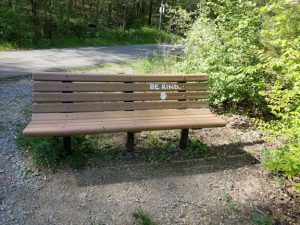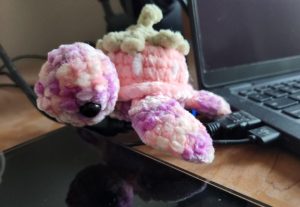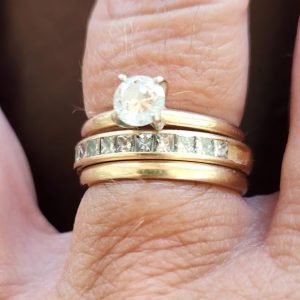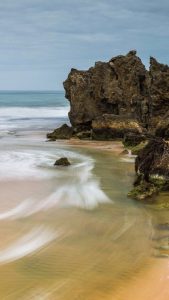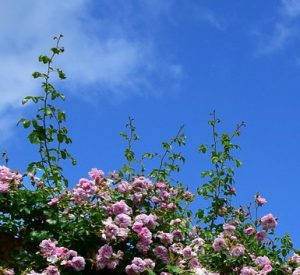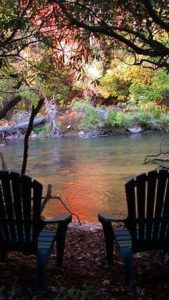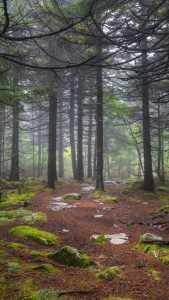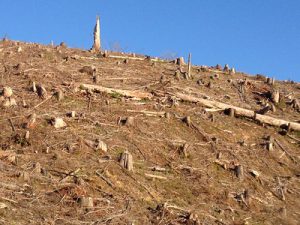After waking up to a cloudy morning on Sunday, I deliberated for a few minutes about what kind of image I wanted on my digital art display. I chose a photo from the online library showing a garden path through a window, with flowers blooming on both sides. The shade from a wooded area in the background went well with the ambient light in my house on this overcast day.
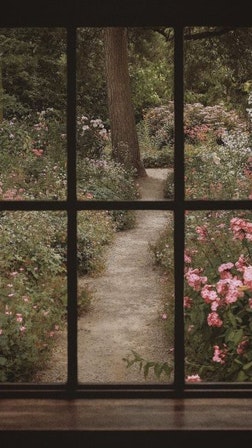
Something about this cozy, refreshing view of a garden in bloom reminded me of the illustrations I had used for blog posts about imaginary conversations with my future self Fannie. This image didn’t look at all like the view from Fannie’s futuristic townhouse, however. I came back to look at it again in the afternoon, still not sure what kinds of associations my subconscious mind had made.
“I take it you don’t think of visiting with me as cozy and refreshing? Now I’m feeling slighted.”
The voice in my mind came from Kass, another version of my future self, who—at age 76—was both younger and snarkier than Fannie. Instead of her usual T-shirt with jeans or shorts, Kass was wearing a plain, modest, long-sleeved burgundy dress befitting an elderly lady welcoming a guest for tea and—could that enticing aroma be fresh-baked blueberry scones?
Conversations with Kass could always be counted on to prove interesting, but cozy and refreshing—not so much. I decided to ignore her trolling and greet her as if this really had been a friendly social visit.
“How lovely to see you again, Kass. Your garden looks beautiful. Shall we go for a stroll before tea?”
“Not today. It’s about to start raining, any minute now.” Right on cue, thunder rumbled in the distance.
I turned away from the window and surveyed what looked like a comfortable, old-fashioned parlor. A long oval table of dark wood, with chairs upholstered in forest green, held the tea service and scones. Ornate floor lamps stood sentinel on either side of the room, burning dimly. A parrot in a gilded cage squawked something that sounded like, “In the world!”
Kass poured the tea while I settled into one of the comfortable dining chairs. She had chosen Earl Grey instead of my usual vanilla caramel. I reached for a scone from a generously filled platter.
“You know, I never meant that you couldn’t do cozy,” I said, as Kass took a seat across from me. “It’s just that whenever you show up, except for now, you’re always outdoors and doing something active.”
Rain spattered on the window, and lightning flashed.
“Maybe you should think about why you see me that way,” Kass suggested.
“Just because I’ve spent more time working on my fitness, probably. I haven’t had as many cozy afternoons.” I took a bite of my scone, which, in all fairness, was delicious. “And this scenario is a bit of a stereotype, wouldn’t you say? A little old lady sitting quietly in the parlor, looking out the window at her flower garden and waiting for a guest to arrive. The only thing it needs is a cat, or several.”
“Herbert would be very unhappy if I had a cat.” Kass gestured toward the parrot. “He would much prefer that there be no cats anywhere in the world.”
Bobbing his head and echoing, “In the world,” the parrot hopped from one wooden bar to another in the cage. He kept looking at the scone that Kass had put on her plate, evidently hoping for a treat.
“Let’s unpack some of those assumptions,” Kass continued, leaving her scone untouched for now. “Why do you feel that coziness has to be such a major production that it can’t fit into an active life?”
I pondered that question as thunder sounded, not far away. Meanwhile, in real life, the sky had brightened a little, and I had finished my tea (vanilla caramel, with a healthy whole-wheat muffin). Putting this post aside for the time being, I decided that I’d write the rest of it later when I came up with a good answer.
Kass showed up again on Thursday, while I was standing in the kitchen.
“So, have you thought of anything more to say about coziness? Not to nag, but the storm outside my window has blown over, and your tea and scones have gotten cold.”
“No, I’ve been too busy with work and rowing,” I admitted. “And that, of course, is the problem. Cozy afternoons and rushing from one activity to another just don’t go together. I wouldn’t really say that coziness has to be a major production, but it does need a reasonable amount of unscheduled time.”
“Do you need to rush off and do anything right now?”
“Well, sort of. This is a regular workday, and I am on the clock. I just came into the kitchen for a minute to get some water.”
Kass tilted her head slightly. “Tell me what you see.”
I followed her gaze, wondering what she was up to. “Not much. Sunlight coming through the blinds.”
“Stand in it for a moment, and just breathe.”
Feeling a bit silly, I took a step to the side. The sun-warmed linoleum felt comfortable under my feet. I took a deep breath and let it out again just as slowly.
“There, doesn’t that feel better?” Kass smiled encouragingly. “I don’t disagree that rushing, when you do it all the time, is indeed a problem—but coziness can be found in small moments.”

